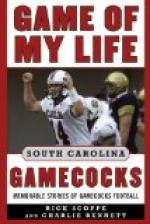One day, before he went to his summer seat, he called a man to him, stripped and whipped him so that the blood ran from his body like water thrown upon him in cupfuls, and when the man stepped from the place where he had been tied, the blood ran out of his shoes. He said to the man, “You will remember me now, sir, as long as you live.” The man answered, “Yes, master, I will.”
Master went away that spring for the last time; he never returned alive; he died at his summer seat. When they brought his remains home all of the slaves were allowed to stop at home that day to see the last of him, and to lament with mistress. After all the slaves who cared to do so had seen his face, they gathered in groups around mistress to comfort her; they shed false tears, saying, “Never mind, missis, massa gone home to heaven.” While some were saying this, others said, “Thank God, massa gone home to hell.” Of course the most of them were glad that he was dead; but they were gathered there for the express purpose of comforting mistress. But after master’s death mistress was a great deal worse than he had been.
When the master died there was a great change of things on the plantation; the creditors came in for settlement, so all of the fine horses, and some others, such as carriage horses, and a few mules also, were sold. The slaves whom master had bought himself had to be sold, but those who had been born on the plantation, given to him by his father, old Col. Dick Singleton, could not be sold until the grandchildren were of age.
As I have stated, my hardships and trials did not end with the race horses; you will now see them in another form.
After all the fine horses had been sold, mistress ordered the men and boys who were taking care of the horses to be put into the field, and I was among them, though small; but I had become so attached to the horses that they could get no work out of me, so they began to whip me, but every time they whipped me I would leave the field and run home to the barn-yard.
Finally mistress engaged a very bad man as overseer, in place of old Ben Usome, whose name was William Turner. Two or three days after his arrival he took me into the field and whipped me until I was sick, so I went home.
I went to mistress and told her that the overseer had whipped me; she asked if I had done the work that he had given me. I told her that master had promised me that, when I got too heavy to ride race horses, he would send me to learn the carpenter’s trade; she asked me if, in case she put me to a trade, I would work, and I told her I would. So she consented.




